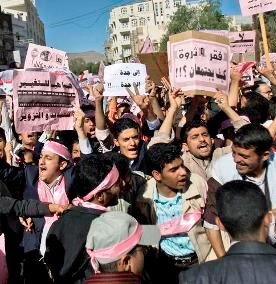Civil War: The Achilles Heel of Yemen

 IRD: Yemen deserves to achieve a revolution because people have been protesting in the streets for 4 months, and it is prepared for civil war as well. The tribal structure of Yemeni society and the fact that the tribes are armed provides the pretext for a civil war. The developments in Yemen can be interpreted in the framework of internal and external players involved inside this country:
IRD: Yemen deserves to achieve a revolution because people have been protesting in the streets for 4 months, and it is prepared for civil war as well. The tribal structure of Yemeni society and the fact that the tribes are armed provides the pretext for a civil war. The developments in Yemen can be interpreted in the framework of internal and external players involved inside this country:1- Protesters who are organized mostly by revolutionary youth are the main actors in the political scene of Yemen. The youth play a great role in the Yemeni uprising; therefore it is labeled the youth revolution.
2- Protesting parties are the secondary actors in Yemen, and have joined the protests in the form of a coalition named the “Joint Meeting Parties”; they also try to cooperate with the PGCC, and to reach an understanding with Ali Abdullah Saleh.
3- The third player in Yemen is the ruling system and its proponents. Despite the wide resignations in Saleh’s government, he still has the partial support of the Hashed Tribe.
4- The interstitial actors in the Yemeni political scene are its tribes. These players have tendencies toward both the ruling party and the opposition.
5- The United States is one of the influential external players in Yemen. In the last decade the US has signed many security cooperation contracts with Yemen in the context of combating terrorism and Al-Qaeda, while providing security and economic aid to Saleh’s government.
6- Saudi Arabia is another external player in Yemen. The Saudis, who control the PGCC, try to manage the transition of power in Yemen. They try to prevent unexpected groups like the Yemeni youth or their opponents to gain any power and create a situation similar to Egypt in the South of the Arabian Peninsula.
Ali Abdullah Saleh is trying to turn the revolutionary scene in Yemen into a civil war in order to delay the transition of power. Saleh has started the war from a very dangerous point. He has entered into a conflict with Sheikh Sadegh Ahmar, the leader of the Hashed tribe. Saleh’s forces invaded his house while the leaders of tribes had gathered there. Saleh is a member of the Hashed tribe, and is trying to demean the Yemeni revolution into an internal tribal conflict.
The important point is that during the past four months hundreds were killed but no one took up arms. However, the killing of a number of people in Sheikh Ahmar’s house brings Yemen to the brink of a civil war. This issue proves the importance of tribes in Yemen and their power to lead the developments.
Yemeni youth insist that protests continue peacefully, and they warn tribal leaders and parties not to be fooled by Saleh’s trick. Since the beginning of the uprisings in Yemen, the United States gave the responsibility of for this crisis to its regional ally, Saudi Arabia. Even though the US backs a power transition in Yemen, it will not use its power in Yemen to prevent Saleh from cracking down on people, and only makes do with issuing conservative statements.
Saudi Arabia, which is responsible for the Yemeni crisis in the PGCC, is not impartial in its policies in Yemen at all. And it hasn’t been able to create any understanding between the two sides.
The Yemeni youth and the opposition, who are not optimistic about PGCC resolutions, do not stand in its way either. If Saleh’s plan succeeds and the revolution in Yemen devolves into a tribal conflict, Saudi Arabia’s role should not be ignored.
Saudi Arabia is influential in both the Hashed leadership and also on Saleh. If these two groups start a civil war, the behind the scenes planning of Saudi Arabia should not be forgotten. In that case, the silence of the West and the US is equal to disregarding the international norms they apply in the international arena themselves.

